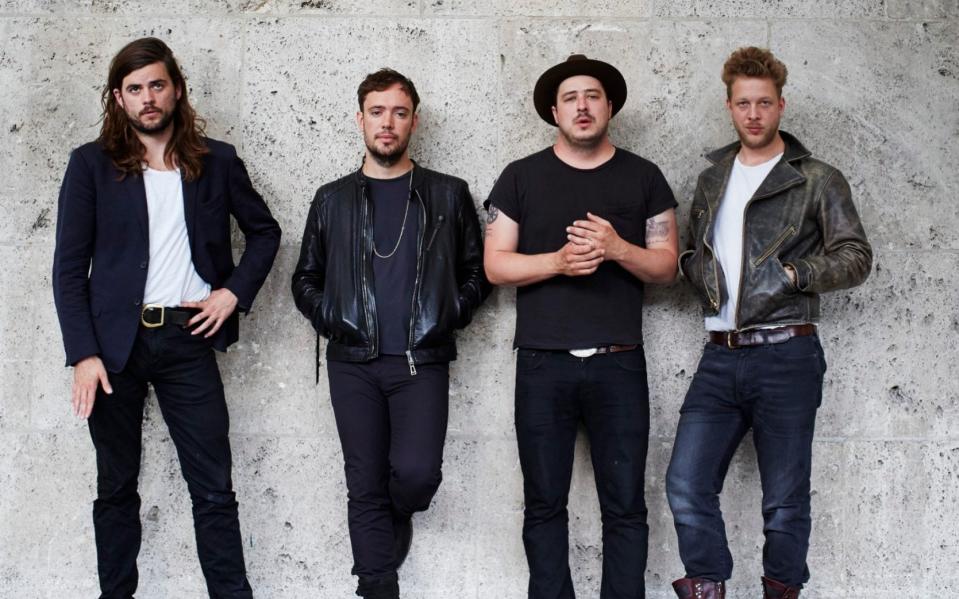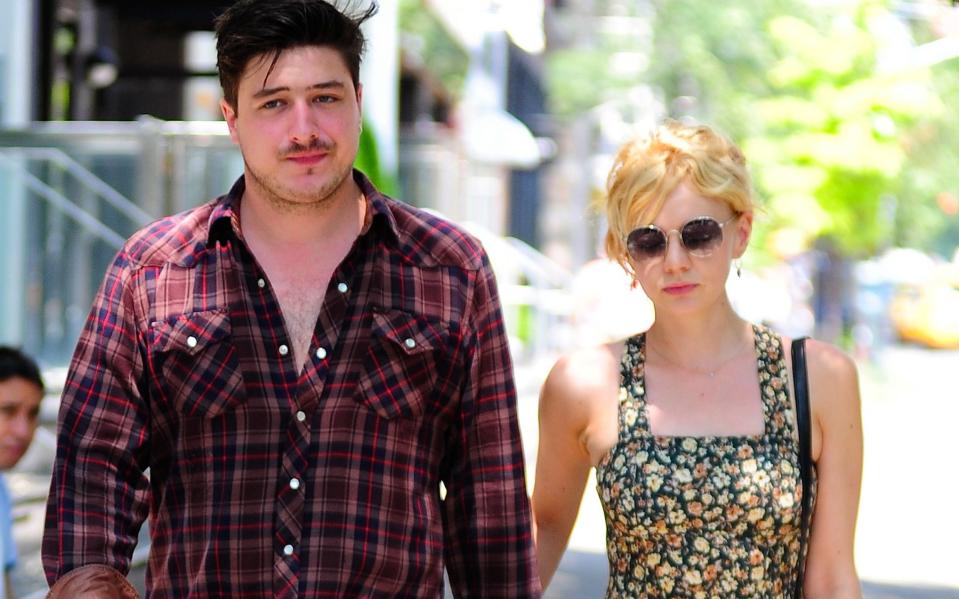How Mumford & Sons became the most annoying band in rock

- Oops!Something went wrong.Please try again later.
Mumford & Son’s most recent album choked out at Number Two in the UK charts. But the bewhiskered quartet will be forever Number One when it comes to being the most annoying band in Britain. Is it the waistcoats? The facial hair that refuses to commit entirely to the part? The Wicker Man-in-expensive-wellies, hey nonny nonny folk pop?
Whatever the reason, these four well-heeled and well-beardy urban folkies have, across the past decade, demonstrated a consistent talent for driving people into apoplexy. In a world divided as never before, one thing on which everyone can agree is Mumford & Sons should be in the dock for crimes against banjos.
That was the case even before their guitarist, who has wavy, shoulder-length hair and is named Winston – see your temperature is spiking already, isn’t it? – thought it might be a good idea to take to social media and praise controversial American extreme-right writer, Andy Ngo.
“Congratulations,” he tweeted to Ngo over the weekend. “Finally had to time read your important book. You're a brave man.”
Ngo’s book, Unmasked: Inside Antifa's Radical Plan to Destroy Democracy, has been roundly criticised for presenting a distorted version of America’s left-right divide. Indeed, Ngo is regarded as beyond the pale by liberals and conservatives alike.
“Supremely dishonest” went an LA Times review of Unmasked. The book was accused of downplaying the shooting dead of African-American teen Trayvon Martin and the murder of Heather Heyer, who was killed while protesting a white nationalist rally. Ngo also described the white supremacist group the Proud Boys as merely a “pro-Trump’ fraternity. Regardless of your politics, these are deranged positions.
Marshall had deleted the tweet within 24 hours. By then the damage had been done, as Twitter erupted in outrage. Not that Mumford & Sons had quite gone from heroes to zeros. The truth is that to many they’ve always been more the latter than the former. Despite selling millions of records and packing arenas and stadiums globally – and even headlining Glastonbury – their true talent has arguably been for bringing together people of different creeds and politics… and uniting these strangers in their ire for Mumford and Sons.
Nor was it the first time Mumford & Sons were accused of keeping unsavoury company. In 2018, three of the band were photographed with controversial Canadian pop-psychologist Jordan Peterson (frontman Marcus Mumford was otherwise engaged). Peterson’s work has been described as riddled with “pseudo facts” and “conspiracy theories” and the association didn’t do much for the Mumford brand.
Obviously, they are not alone in provoking a strong negative response. Ed Sheeran has had a target on his back from the moment he picked up a guitar and started to muck about with FX pedals. Coldplay were founding members of this club of punchbag pop stars. However, with Mumford & Son, the venom is at a whole other level. They don’t just get under our skin. They drill deep into our marrow. They are pop marmite, if marmite made you break out in hives and have recurring nightmares in which you were chased by giant ravenous banjos.

The reasons for this are both complex and straightforward. In the first instance, it is bound up with their ferociously jaunty music.
“Christian folk-pop” is not a genre that screams bums on seats or millions of streams. Yet Marcus Mumford’s redemptive lyrics – informed by his upbringing as the expensively-educated child of evangelical Christian parents – spoke to audiences when the band put out their debut album, Sigh No More in February 2010.
Can I share a secret? I don’t hate Sigh No More. It captured Mumford & Sons in a protean state, before the image of the group as the Cotswolds Wurzels was burnished in our minds. The Cave has a haunting dash to it; Little Lion Man is uplifting arena folk. Lots of other people didn’t hate it either. Despite generally dismissive reviews, and from a slow start, it sold and sold. By year’s end was on its way to shifting a million copies in the UK.
This was a sign of the times as much as anything else. “Nu-folk” – earthy music performed by posh types from London and surrounding environs – was at the time massively in vogue. And Mumford & Sons, with their waist-coats and their hats, were the folkiest of the bunch (and among the poshest too).
What came next wasn’t a backlash exactly. If anything, it was more “frontlash”. No sooner had Mumford & Sons became a phenomenon than critics and vast swathes of the public were getting their blunderbusses out. Typically a band is allowed ride that first swell of success before the negativity descends. In the case of Marcus and chums, the haters were already lying in wait.
They were lots of nu-folkies about at that time and they were to an extent interchangeable. Noah and the Whale had the same village fête quality as the Mumfords. Laura Marling, who would go on to become one of her generation’s great songwriters, vied with them for poshness (her father is an baronet and a knight). And Johnny Flynn – who has branched into acting and was last seen taking a tumble in the muck with Lily James in Netflix’s The Dig – shared their cocksure, suited-and-booted quality.
All were jeered and upbraided to varying degrees. But the antagonism quickly catalysed around Mumford & Sons. Frightened Rabbit, the great indie band from Scotland, described them as s***e. The Fall’s Mark E Smith branded the troupe as “retarded Irish folk singers” (I’m not sure what the “Irish” part has to do with anything).
So the hate was strong. It may not have helped that in person, they did come across mildly (but not always mildly) irksome.
I recall being summoned to interview Mumford & Sons early in their career, before anyone had heard of the group. All these years later, I cannot recollect which of the two I encountered, though Marcus Mumford wasn’t there. As my bus was running late, I’d had to dash to the record company office and arrived disheveled and more than a bit sweaty. Whatever the opposite of nu-folk chic was, I was owning it completely .
It didn’t go well. The two non-Marcus Mumfords, having presumably noted I was slightly up against it and could do with a lie down, began to hold hands across the table during the interview and started to giggle. I ploughed on and they just chuckled and chuckled and continued squeezing each others’s hands. This is what jolly japery looked like up close and with the doors locked.
Slouching home, I remember thinking they were rather odd and probably wouldn’t get anywhere. Ten minutes later they were the biggest band in the world, which was a surprise. They were also the most hated which, having met them, did not shock me especially.
Privilege is always a tricky subject in pop as it is bound up with rock’s historical obsession with authenticity and legitimacy. That said, Mumford & Sons are undoubtedly from supremely cushy backgrounds. Marcus Mumford was born in California and educated at King’s College School in Wimbledon. Bassist Ted Dwane is the son of a shipping broker and spent some of his childhood in Singapore.

Poshest of them all however, is Winston Marshall, author of that fateful Andy Ngo tweet. He is the son of Sir Paul Marshall, co-founder of the Marshall Wallace hedge fund, with a personal net worth of £630 million. On his mother’s side meanwhile he is descended from the aristocratic French Balkany family.
Nor have the band always done themselves huge favours in their dealings with the media. In 2012, shortly before the release their second album Babel, Marcus Mumford married actress Carey Mulligan. They had known each other since they were teenagers, when they were pen-pals.
The wedding was quite the affair, with Colin Firth, Sienna Miller and Jake Gyllenhaal in attendance. Music was courtesy of up-and-coming cabaret singer Adele.
This was all breathlessly reported, in the pages of Hello! and elsewhere. But when it came to promoting Babel, Mumford & Sons issued a warning to journalists that any questions, about “famous friends” would lead to the interview being immediately ended. What happened, of course, is that they spent all their time talking about why they didn’t want to talk about their famous friends.
In 2018, the anti-Mumford vitriol intensified as the Jordan Peterson photograph circulated. Just like Marcus’s Hollywood wedding, the timing could have been better as the group were readying their new LP, Delta. Once again the promotional cycle was dominated not by the music but by tangential events.
Mumford & Sons, to their credit, have never complained about the treatment they received. That said, Marcus Mumford has pointed out that, though other celebs posed with Peterson (for instance Russell Brand), only they had suffered a backlash. In the same interview, with the NME, Winston Marshall declined to give a yes or no answer when asked whether he would be willing to perform for Donald Trump.
“I have a little bit of frustration with the politicising of music,” he said. I don’t mind when artists are political, but I think politics is f------ complicated. It’s different from three years ago when we were doing promo for [third LP] Wilder Mind – we weren’t ever asked about politics. People didn’t care, but now everyone’s got a f------ opinion. Everything is 'Politics this, politics that'. It’s a massive change.”
Marshall was also asked about the Peterson photo. Again he didn’t quite chuck a public hate-figure under a bus. “Even [people] saying he was right-wing, which I don’t think is true. His politics aren’t really of interest to me; I’m more interested in his psychology and his other work.”
Tweeting in support of a controversial figure such as Andy Ngo is not a good look (to understate the case massively). But what’s strange is how these views have been heralded on social media not as a career-destroying bombshell but merely as vindicating the idea that Mumford & Sons were inherently ghastly all along.
And yet, clearly not everyone feels that way. Delta may have lost out in the battle for UK number one to Michael Bublé – but it topped the American charts, selling nearly a quarter of a million copies in its first week. Twitter’s view that Mumford & Sons are the worst thing ever is by no means universally shared.
The truth of that will become more apparent if you see the group in concert. Reviewing their most recent tour in late 2018, I expected a night of banjo-fuelled dirges yet was floored by the sheer joy that rippled around the room. For fans, this wasn’t just another night out. Mumford & Sons’s music really, truly mattered. At one point, they played a relatively obscure song and the guy in the row in front of me jumped to his feet. His eyes were closed and his head swayed from side to side. He was in spiritual ecstasy.
With this latest controversy, Mumford & Sons have probably sealed their fate as folkie punchbags. Yet it should not be overlooked that they matter hugely to a lot of people. To fans, the banjos, beards and lyrics about belief and redemption are not pop micro-aggressions but articles of faith that help get them through the day.
So yes, by all means, criticise Mumford & Sons for their politics and their outfits. But perhaps we should stop short of telling people what sort of music they are or are not allowed to like.

